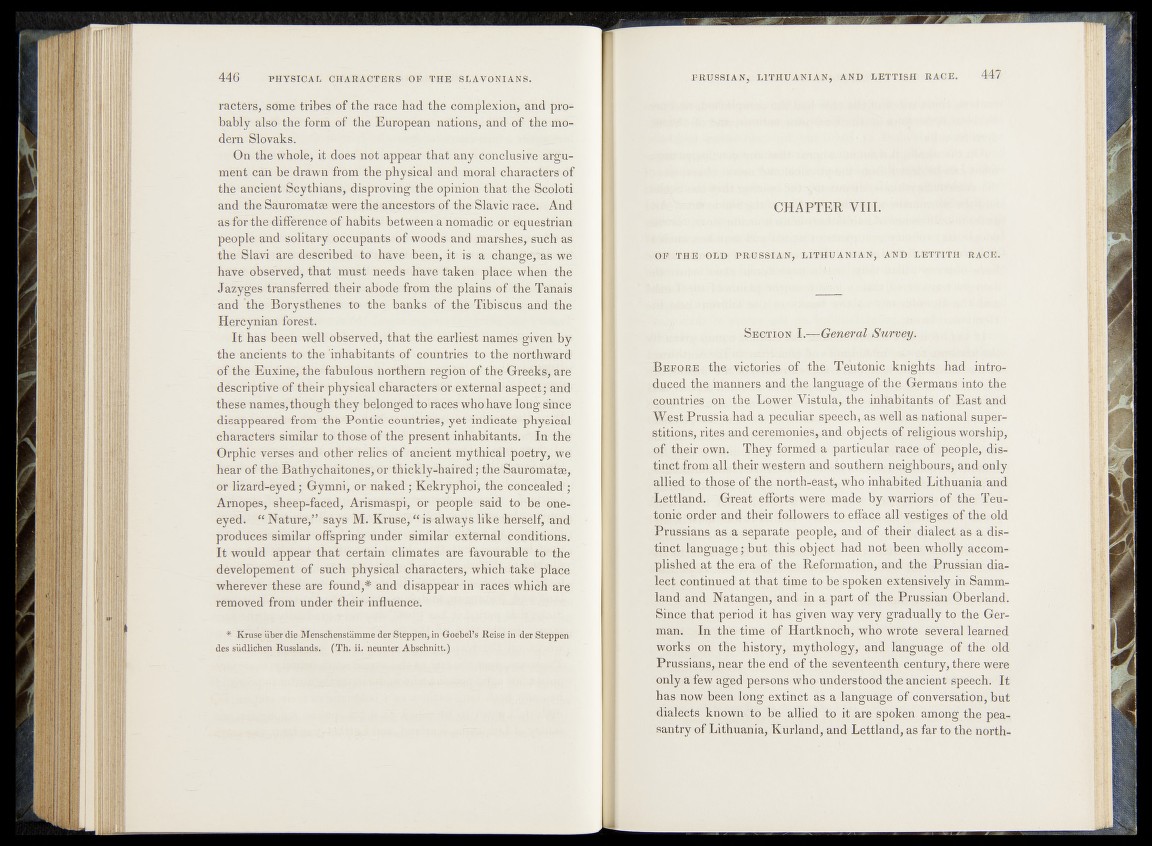
racters, sdme tribes of tHe race had the complexion!, and pro»
bably also the form of the European nations^ and of the modern
Slovaks.
On the whole, it doe's' not appear that any conclusive' argument
can be drawn from the physical and moral characters Of
the ancient Scythiansy diisproving the opinion th a t the Scoloti
and the Sanromatae were the ancestors of the Slavic racer And
as for the difference of habits between a nomadic or equestrian
people and solitary, occupants of woods and mafshes, Such as
the Slavi are described to haver been, it is^a change^as we
have observed, that must needs have taken: place when thd
Jazyges transferred their abode from the plaint o ftk eT an ais
and the Borysthenes to the banks of the Tibiscusv;an5d the
Hcrcynian forest.
I t has been well -observed, th at the earliest namOs'^giybn by
the ancients to?the’inhabitants of cauMTi"es*$t$ the Northward
of the Euxine, the fabulous northern region o f the Oreeksy ard
descriptive of their physical ch a ra c te rs^ external-as^bfet^alid
these names, though they belonged to-races who have forfg ttii'e
disappeared from the Politic countries,'.yC^'iridicate physical
characters similar to'those of the preserit inhabitants. In the
Orphic yeiaeS^nd other relics of ancient mythieO,bpo'dtry,- we
hear of the Bathychaitones,@rthickly-dinired ; the ‘Saurornadse,
or lizard-eyed; Gymni, or naked ; Kekryphoi, thecdhicelaled’;
Arnopes, sheep-faced, Arismaspi, for pebpfotJ gaid to b e 'o b eyed;
“ Nature,” says M. Kruse, “ i s a l why S'like herself,"'and
produces similar offspring under similar external' conditions.-
It would appear that certain climates are favourable * to* the
developement of such physical characters, which tak e place
wherever these are found,* and disappear in races which are
removed from under their influence.
*■ -Kruse über die Menschepstämme der Stephen, in Goebel’s Reise in der Steppen
des südlichen Russlands. (Th. ii. neunter Abschnitt.)
CHAPTER VIII.
OF THE îQli©< PRET SS I ASSI, j LITHUANIAN, AND LETTITH RACE.
$ ,jSfECgxo^ I .-^General Survey, .
B e f o r e i t^q ^ e fo rie s *otf the T ^ tp n lc ; k n |g |||^ had in tro duced
the ipannem andythe, langt^g[e;t,qf.the Germans into the
,cpu,ntrie,s ^Qn( ..the Lo^er Vistu-la,-the^ inhabitants of East-and
West|P,i3ut§sia,had a ppculiar, wplf as national superg^
iti-OjUST, ip.-te,s and ceremonies, and obj ects, o f religious worship,
!$§ their pwn.«, They formed, a particular* race p£ipeople, distinct
ïipm all;thei^ postern and-southern-neighboura, and only
all^.-Jtp,tJi9,s® o£j.$ie north-east’, .who inhabited Lithuania: and
Lettland.! ~ Greats effortstwere made, by warriors of the Teutonic
order and their followers, to efface grlhyestjg.es. Of the old
Prussians as,a separate peopl|^,^n^pf their dialect as a distinct.
langnage^but this object had n o f e ^ e ^ wholly acjtom-
f i s h e d at the era.of , the Reformation, and dhe Prussian diale
c t, epntinuçd at .that time |^j;b^sppken extensively in Samm-
land and Natangen, and in a(part of, the Prussian Oberland.
fsjSince thabperiod it has given way very gradually to the German.
In |the time of Hartknocb, who'wrote several learned
works on the history,^mythdjdgyj and language of the old
Prussians,.near the,end of the seventeenth century, there were
only a few aged persons who-understood the ancient -speech. It
has now been long extinct as a language of conversation, but
dialects knowm'to be allied to it are spoken among the peasantry
of Lithuania, Kurland, and Lettland, as far to the north